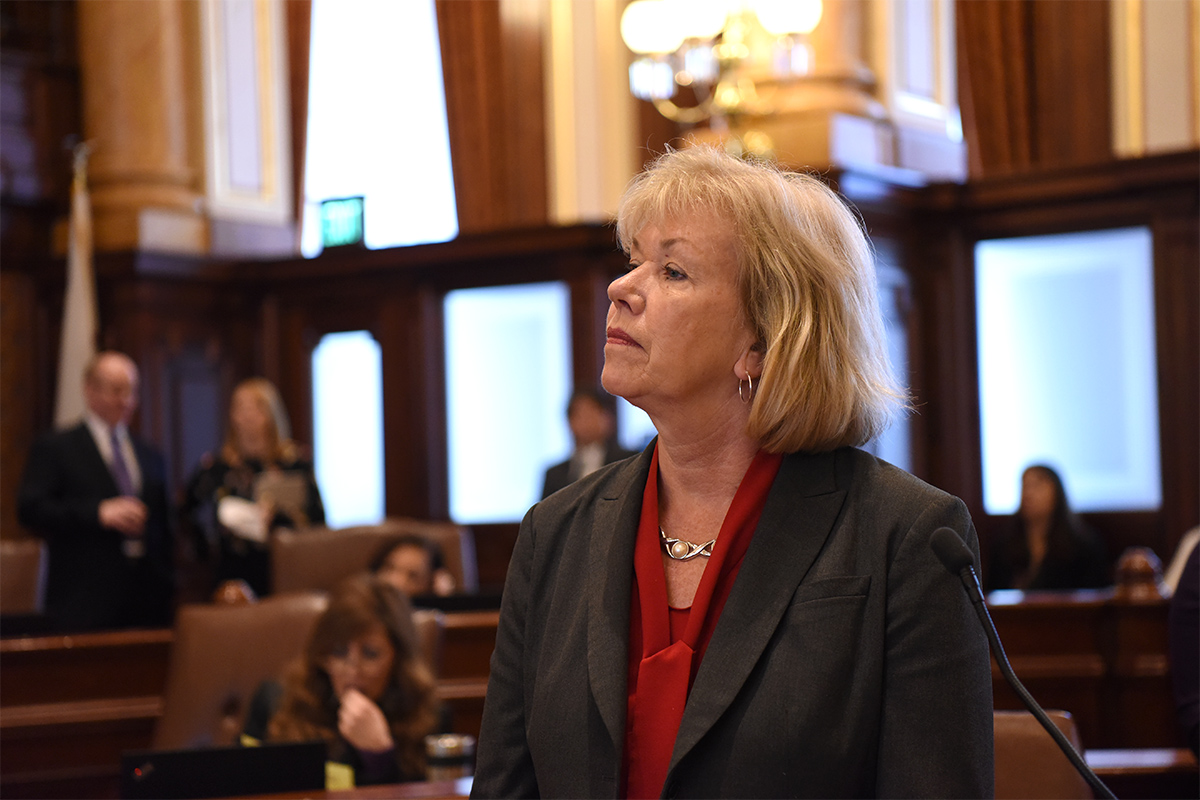- Details
- Category: Features
Friday afternoon Gov. JB Pritzker announced that schools will remain closed for the rest of the school year to contain the spread of COVID-19. Remote and e-learning will continue in place of in-person classes.
We know many Illinois families were hoping to return to their regular routines by the end of the school year. Students miss their friends and teachers, and parents are eager to watch their children graduate, go to prom, and enjoy other milestones.
But for the sake of everyone’s health and safety, it’s vital that we follow the guidance we’ve received from top health care and science experts around the world. That means continuing to stay home as much as possible.
We are taking the necessary steps to ensure our schools are prepared to handle remote learning: Illinois schools will receive $569 million in federal funding to help equip students with technology and internet access, support teachers in developing their remote instruction skills, and continue providing meals to children and communities during closures. When schools reopen, the Illinois State Board of Education (ISBE) will release recommendations to address learning loss and students’ social-emotional needs.
To help you through this difficult time, here are a few resources you may find useful:
Learning from Home

At-home learning presents a unique set of challenges for both students and parents. ISBE has put together a list of free resources and tips to help teachers and parents support student learning while schools are closed. For advice on keeping students engaged in education, visit www.isbe.net/keeplearning.
Families of children with disabilities may need extra support during this time. The Illinois Autism Partnership and Easterseals have developed a School Closure Toolkit to support children with autism through school closures. Other special education resources, including activity ideas and home learning packets, are available on the Easterseals website.
Finding Child Care
With schools and many daycares closed, some essential employees are worried about finding care for their children while they are at work. Find contact information for available resources in your area by searching by your county or zip code here. Essential workers in health care, human services, government, and essential infrastructure may eligible to receive child care through Illinois’ Child Care Assistance Program. Get more information and access application materials here.
Managing Mental Health
The COVID-19 pandemic has been challenging for many Illinoisans—being stuck at home can be harmful to anyone’s mental health, including children. If you or your child is feeling anxious, depressed, or overwhelmed during this time, there are resources available to help.
Illinois has launched a free-of-charge emotional support text line, Call4Calm, for residents experiencing stress and mental health issues related to COVID-19. To speak with a mental health professional, text “TALK” (or “HABLAR” for Spanish-language services) to 552-020.
The National Alliance on Mental Illness (NAMI) also offers support groups and other resources for individuals who may need help dealing with a mental health condition. Call 800-950-NAMI (6264) or visit www.nami.org to find what resources your local NAMI chapter is offering during the COVID-19 crisis.
Make no mistake: The next few weeks won’t be easy. But in order to protect our friends, loved ones, and neighbors from COVID-19, we must make sacrifices.
Our state is acting with the input of top medical experts, scientists, public health researchers, and epidemiologists—based on their advice, staying home is our most powerful tool to fight the spread of this virus. We have begun to flatten the curve, but we must maintain our course to keep the infection under control and prevent our health care system from becoming overwhelmed.
If you have questions about school closures or need other assistance, my staff is working remotely to support you during this time. Give us a call at 847 945-5200 or visit, and we’ll do our best to address your concerns.
Stay healthy. Stay safe. Stay home.
- Details
- Category: Features
SPRINGFIELD – For years State Senator Julie Morrison (D-Lake Forest) has demanded more money to fix the well-documented problems at the Department of Child and Family Services that have led to mistreatment of the state’s most vulnerable population. On Wednesday, Gov. J.B. Pritzker shared Morrison’s concerns, and proposed more than $100 million in additional funding for the troubled state agency.
“DCFS has experienced more turmoil in the past decade than any other state agency,” Morrison said. “While not all of the agency’s problems revolve around funding, many of the high-profile failures come from it being cash-strapped and squandering its meager resources.”
Morrison has been a constant advocate for more funding and oversight for DCFS following years of reporting issues, understaffing and mistreatment of children in the system. The nearly $147 million in additional funding proposed Wednesday would be used to boost the workforce, which would reduce caseloads for investigators and allow more attention to go toward the high demand of services.
“There is no question the agency needs more employees and resources to hire highly trained workers who have the determination and emotional stability to take on one of the toughest jobs,” Morrison said. “I applaud the governor’s commitment to help this already at-risk group of children.”
If the proposed budget passes, DCFS will receive $1.46 billion in funding, 11% more than the current budget allots for the organization.
- Details
- Category: Features
SPRINGFIELD – Dental hygiene is directly linked to a person’s overall health, but many Illinoisans aren’t receiving the proper care they need due to the high cost of treatment or because the lack of coverage for anesthesia. State Senator Julie Morrison (D-Lake Forest) hopes to curb the price of dental care by requiring Medicaid to extend its coverage.
Two bills attempting to address dental care services that are either not covered or under-reimbursed by Medicaid were part of a subject matter hearing in the Senate Human Services Committee Tuesday.
Senate Bill 2484 expands coverage of dental care and anesthesia for those with autism or a developmental disability to make those individuals more comfortable when visiting the dentist.
“Going to the dentist can be uncomfortable for anyone, but the stress is amplified for children and adults with autism and other developmental disabilities,” Morrison said. “Some patients with developmental disabilities are unable to endure regular dental exams or cleanings without general anesthesia. This measure will help more people be able to afford the treatment they need.”
According to the Journal of the American Dental Association, because it is difficult for them to get treatment, people with developmental disorders suffer “a high burden of dental disease.” More than 30% of the patients studied suffered from untreated cavities and 80% from serious gum infections.
Additionally, the measure requires Medicaid to cover dental care, including anesthesia, that is provided in a hospital or surgical treatment center for any individual with a medical condition that requires hospitalization or general anesthesia.
“Keeping a healthy set of teeth is more important than people think,” Morrison said. “Many diseases and conditions have a direct correlation to dental health. Making sure teeth get the attention they need is an important part of an individual’s overall well-being.”
Morrison is also spearheading Senate Bill 2493, which specifies Medicaid reimbursement rates for anesthesia-related services. For example, under the measure, moderate sedation would be at a reimbursement rate of $181 and deep sedation would be at a rate of $214. This might incentivize more dentists to accept Medicaid.
- Details
- Category: Features
SPRINGFIELD – Following more than a year of ethics violations under the dome, Gov. JB Pritzker said during Wednesday’s State of the State address one of his main priorities of the upcoming legislative session is to hold lawmakers to the highest ethical standards – a priority shared by State Senator Julie Morrison.
“Gov. Pritzker’s call for action against the repellant actions committed by state lawmakers is a great step toward ending unethical behavior,” Morrison (D-Deerfield) said. “I applaud the governor’s desire to fight corruption, and I will work diligently with my colleagues to ensure we pass real, lasting ethics reform this legislative session.”
During the upcoming legislative session, Morrison is sponsoring Senate Bill 2506, which requires members of the General Assembly to disclose if they have conflicts of interest on measures they are taking official action on – which includes voting for a bill. If legislators do have conflicts of interest, they would be responsible for filing written statements declaring the conflict.
“It’s more important than ever for us to strive for more transparency, greater disclosure and a higher standard of conduct,” Morrison said. “This commonsense legislation will call for lawmakers to work in the best interest of the people of Illinois by reporting if they have a conflict of interest on a legislative matter they are voting on.”
Morrison is also sponsoring Senate Bill 2506 – which would create changes to the statement of economic interest form that must be completed by a number of state employees, candidates running for office and public officials. Those changes include clarifying the definition of “economic relationship” and tweaking the definition of “investment real estate.”
Senate Bill 180, also sponsored by Morrison, would prohibit members of the General Assembly from negotiating future employment with a lobbying entity during the member’s term of office, if the lobbying entity engages in lobbying the General Assembly during that time.
“Every person who serves in elected office should serve the people of Illinois – not themselves nor their wallets,” Morrison said. “I will continue to work with my fellow lawmakers and the governor to ensure we are all held to the highest ethical standards.”
More Articles …
Page 4 of 14









